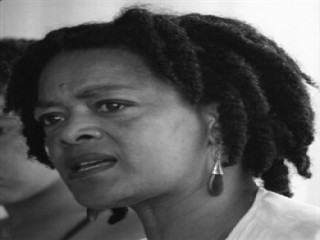
Toni Cade Bambara biography
Date of birth : 1939-03-25
Date of death : 1995-12-09
Birthplace : New York City, New York, US
Nationality : American
Category : Famous Figures
Last modified : 2011-05-20
Credited as : Novelist, social activist, Gorilla, My Love
1 votes so far
Her first book, Gorilla, My Love (1972), collected fifteen short stories, written between 1950 and 1970. Most of the stories in Gorilla, My Love are told through a first-person point of view. The narrator is often a sassy young girl who is tough, brave, and caring. Bambara called her writing upbeat fiction. Included were "Blues Ain't No Mockin Bird" as well as "Raymond's Run."
Bambara was active in the 1960s Black Arts movement and the emergence of black feminism. Her anthology The Black Woman (1970) with poetry, short stories, and essays by Nikki Giovanni, Audre Lorde, Alice Walker, Paule Marshall and herself, as well as work by Bambara's students from the SEEK program, was the first feminist collection to focus on African-American women. Tales and Stories for Black Folk (1971) contained work by Langston Hughes, Ernest J. Gaines, Pearl Crayton, Alice Walker and students. She wrote the introduction for another groundbreaking feminist anthology by women of color, This Bridge Called My Back (1981), edited by Gloria Anzaldúa and Cherríe Moraga. While Bambara is often ascribed as a "feminist," in her chapter titled "On the Issue of Roles", she writes, "Perhaps we need to let go of all notions of manhood and femininity and concentrate on Blackhood."
Her novel The Salt Eaters (1990) deals with the disappearance and murder of forty black children in Atlanta between 1979 and 1981. The novel Those Bones Are Not My Child or If Blessings Come (title of the manuscript), was published posthumously in 1999. It was called her masterpiece by Toni Morrison, who edited ist and also gathered Bambara's short stories, essays, and interviews in the volume Deep Sightings & Rescue Missions: Fiction, Essays & Conversations. (Vintage, 1996).
Her work was explicitly political, concerned with injustice and oppression in general and with the fate of African American communities and grassroots political organizations in particular, esp. The Salt Eaters. Her script for two awards-winning Louis Massiah film The Bombing of Osage Avenue dealt with the massive police assault in Philadelphia on the headquarters of MOVE, at 6221 Osage Ave., on May 13, 1985.
Female protagonists and narrators dominate her writings, which was informed by radical feminism and firmly placed inside African American culture, with its dialect, oral traditions and jazz techniques. She was always influenced by the people of Harlem and by her strong-willed mother, Helen Bent Henderson Cade Brehon, who urged her and her brother Walter (an established painter) to be proud of African American culture and history.
Bambara contributed to PBS's American Experience documentary series with "Midnight Ramble": Oscar Micheaux and the Story of Race Movies. She also was one of four filmmakers who made the collaborative 1995 documentary W.E.B. Du Bois: A Biography in Four Voices.
Author of books:
Gorilla, My Love (1972, short stories)
The Sea Birds Are Still Alive: Collected Stories (1977, short stories)
The Salt Eaters (1980, novel)
If Blessing Comes (1987, novel)
Deep Sightings and Rescue Missions (1996, anthology)
Those Bones Are Not My Child (1999, novel)
















